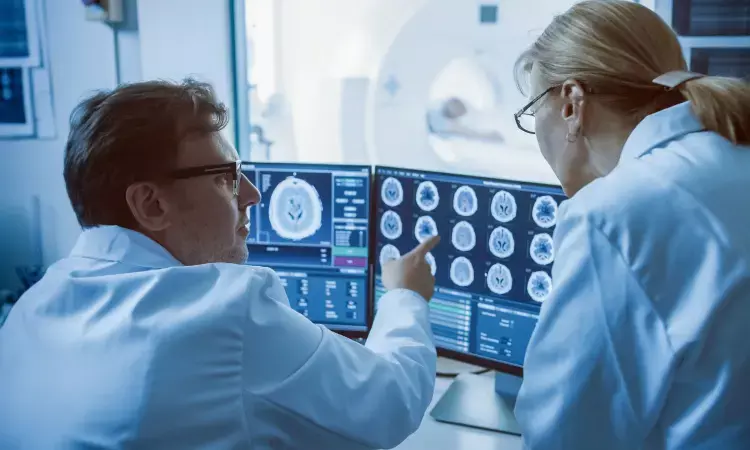- Home
- Medical news & Guidelines
- Anesthesiology
- Cardiology and CTVS
- Critical Care
- Dentistry
- Dermatology
- Diabetes and Endocrinology
- ENT
- Gastroenterology
- Medicine
- Nephrology
- Neurology
- Obstretics-Gynaecology
- Oncology
- Ophthalmology
- Orthopaedics
- Pediatrics-Neonatology
- Psychiatry
- Pulmonology
- Radiology
- Surgery
- Urology
- Laboratory Medicine
- Diet
- Nursing
- Paramedical
- Physiotherapy
- Health news
- Fact Check
- Bone Health Fact Check
- Brain Health Fact Check
- Cancer Related Fact Check
- Child Care Fact Check
- Dental and oral health fact check
- Diabetes and metabolic health fact check
- Diet and Nutrition Fact Check
- Eye and ENT Care Fact Check
- Fitness fact check
- Gut health fact check
- Heart health fact check
- Kidney health fact check
- Medical education fact check
- Men's health fact check
- Respiratory fact check
- Skin and hair care fact check
- Vaccine and Immunization fact check
- Women's health fact check
- AYUSH
- State News
- Andaman and Nicobar Islands
- Andhra Pradesh
- Arunachal Pradesh
- Assam
- Bihar
- Chandigarh
- Chattisgarh
- Dadra and Nagar Haveli
- Daman and Diu
- Delhi
- Goa
- Gujarat
- Haryana
- Himachal Pradesh
- Jammu & Kashmir
- Jharkhand
- Karnataka
- Kerala
- Ladakh
- Lakshadweep
- Madhya Pradesh
- Maharashtra
- Manipur
- Meghalaya
- Mizoram
- Nagaland
- Odisha
- Puducherry
- Punjab
- Rajasthan
- Sikkim
- Tamil Nadu
- Telangana
- Tripura
- Uttar Pradesh
- Uttrakhand
- West Bengal
- Medical Education
- Industry
Is Functional MRI capable of reading your mind?

USA: Scientists have developed a non-invasive brain-computer interface that can decode continuous language from cortical semantic representations recorded using functional magnetic resonance imaging (fMRI). The study was published in the Journal of Nature Neuroscience.
The objective of language decoding is to utilize recordings of brain activity to anticipate the words that an individual is listening to, speaking, or envisioning. They tested the decoder across the cortex and found that continuous language can be separately decoded from multiple regions.
The new decoder can generate intelligible word sequences that recover the meaning of perceived speech, imagined speech, and even silent videos, indicating that a single decoder can be applied to a range of tasks.
The predictions made by the decoder frequently captured the essence of an individual's internal speech, however, they did not reproduce an exact transcript. In approximately fifty percent of the instances, the decoder generated text that accurately or closely corresponded to the intended connotations of the words that a person was contemplating.
The study's findings are promising because brain-computer interfaces that decode continuous language from non-invasive recordings could have many scientific and practical applications, including communication for people with speech disorders and decoding thoughts. Currently, non-invasive language decoders can only identify stimuli from among a small set of words or phrases.
To ensure mental privacy, the study also tested whether successful decoding requires subject cooperation and found that subject cooperation is required to train and apply the decoder.
The researchers hope that their findings will pave the way for the development of non-invasive language brain-computer interfaces and lead to significant advancements in communication and neuroscience.
Dr. Jerry Tang stated that “Our research is the pioneering study that can decode continuous language, which surpasses the ability to recognize just single words or sentences, from non-invasive brain recordings. Presently, decoding language from neural activity primarily depends on invasive brain-computer interfaces that necessitate surgical implants.”
Reference:
Tang J, et al "Semantic reconstruction of continuous language from non-invasive brain recordings" Nat Neurosci 2023; DOI: 10.1038/s41593-023-01304-9
Dr. Mahalakshmi Sivashankaran joined Medical Dialogues as an Intern in 2023. She is a BDS graduate from Manipal College of Dental Sciences, Mangalore Batch 2022, and worked as a Junior Resident at VMMC & Safdarjung Hospital at the Department of Dental Surgery till January 2023. She has completed a Diploma in Executive Healthcare management from the Loyola Institute of Business Administration, developing skills in Healthcare Management and Administration. She covers several medical specialties including Dental, ENT, Diagnostics, Pharmacology, Neurology, and Cardiology.
Dr Kamal Kant Kohli-MBBS, DTCD- a chest specialist with more than 30 years of practice and a flair for writing clinical articles, Dr Kamal Kant Kohli joined Medical Dialogues as a Chief Editor of Medical News. Besides writing articles, as an editor, he proofreads and verifies all the medical content published on Medical Dialogues including those coming from journals, studies,medical conferences,guidelines etc. Email: drkohli@medicaldialogues.in. Contact no. 011-43720751


